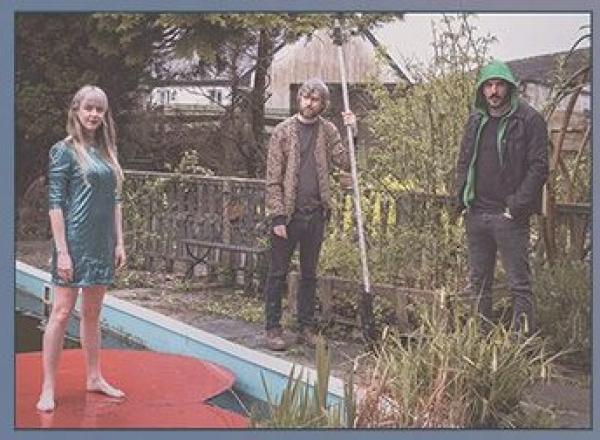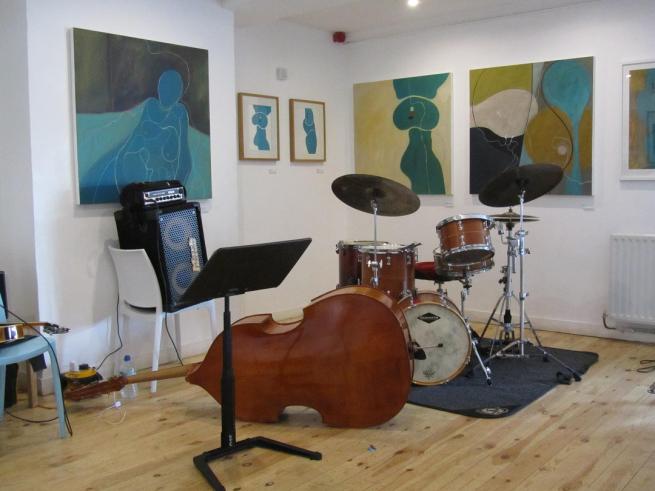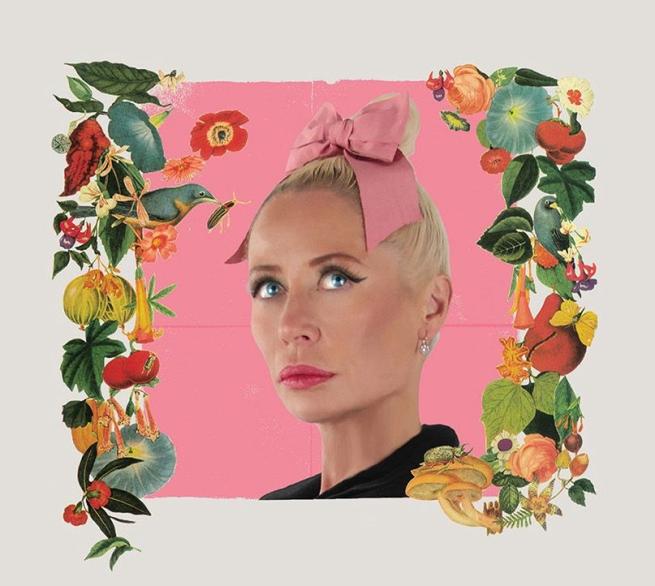
History is a chronological timeline, often misinterpreted and disputed. Rooted in landscape and geography, people and moments, it thrives on contradiction: victors and losers, mythology and reality. Within that landscape, songs are arguably subject to even more contrasts. Songs that have existed for centuries can seem immutable and anchored to time. A new generation of Irish musicians are keen to acknowledge that musical legacy, while reimagining the songs within a contemporary context.
Poor Creature are one such, a trio comprised of Ruth Clinton, Cormac MacDiarmada and John Dermody. All three are members of other bands (Landless and Lankum respectively) who have built a large following on re-interpreting songs from the past. They formed during lockdown and the original line-up was initially just Ruth and Cormac. “Ruth and I had played together a lot before and then lockdown hit. Suddenly we had a load of time at home with a room full of instruments, so it started from there,” says Cormac. The decision was also not a conscious one, adds Ruth: “We never said: ‘let’s start a band’ it was more ‘let’s arrange this song’ and see what happens.”
Their first gigs were online during the pandemic as part of cultural festivals. “One was an online event called Box Moon, organised by Natalia Beylis and Decy Synnott. Musicians and artists from all over the country made videos at home and watched them together on Twitch, a rare moment of community at that time. We made a tape recording of An Draighneán Donn, using Ruth's new theremin. It grew from there.” It slowly built into something. John joined about 18 months later and remembers their first gig, a benefit show to pay for a hip operation for a friend's greyhound, for which they had no time to rehearse. “We just improvised and couldn’t even hear each other – but it was kind of magical, and that sort of carries into how we make the songs.
The process of creating the arrangements is very much driven by the instruments themselves, specifically with a vintage organ. “Ruth got this lovely, old Hohner Organetta, which has a bunch of pre-programmed drumbeats. We sometimes start with one of them and the song develops from there, like on ‘All Smiles’ and ‘The Whole Town Knows.” So we had these fixed, looping beats, with no deviation. Later, when John joined, he added a natural kind of ebb and flow. We got the best of both worlds: this fixed thing, and then something else dancing around it, says Cormac. “When I joined and we went into the studio, the spine of everything was already in place,” says John. “Some of it was simple, but it was also tricky because in terms of metronomic timing, folk music doesn't necessarily give a shit about drummers - timing is often at the behest of the singer. Often, I come in after the fact so it’s a different relationship and a different conversation happening in the songs. So on the quieter moments, rather than something that is foundational and perhaps providing that momentum, there is something more conversational happening, more like weaving.”
It makes sense that Poor Creature manifested out of the lockdown. In times of surrealness and separation there’s comfort in looking back to the past, to stories of being parted, of love and of loss. “There’s definitely a unifying theme of loss and separation on nearly all the songs on the records. When working on ‘The Whole Town Knows’ (a Ray Lynam & Philomena Begley track), it transformed from a song about cheating hearts to something else. “It talks about how we can't go on living this way, which became a metaphor for the climate crisis and the general destruction of the planet. ‘Lorene’, which Cormac sings solo, is an epistolary tale of missing someone, and the despair of unanswered letters, which channels Chantal Akerman’s News From Home.
There are hundreds of songs the band could have chosen for the record, but decisions were made by specific motivations. The bones of a tune had to appeal, and there was zero interest in playing a version of someone else’s song verbatim. With music that’s being passed down, and reworked, it gets given a new context with each generation. “For us, it’s important to pull something else out of a song, it’s not necessarily about turning everything into an apocalyptic stomper… each track has something that speaks to our DNA,” according to John.
Poor Creature’s sound – particularly in the context of contemporary Irish folk – offers something unique. There’s the gauzy, underwater, almost psychedelic seams of ‘Bury Me Not’ and ‘Adieu Lovely Erin’. ‘All Smiles Tonight’ and ‘Hicks’ Farewell’ nod to the influence of American folk/bluegrass acts like Doc Watson and the Louvin Brothers. These shifting sounds are made possible by producer John ‘Spud’ Murphy, who has produced all of Lankum’s albums, and worked with Junior Brother, ØXN, Pretty Happy, Ye Vagabonds as as well as the final two albums by The Jimmy Cake, with whom John has played for over 20 years. “Spud is just incredibly talented”, says Cormac. “He'll keep sending back mixes, and they just keep on getting better and better. He’s got this attention to detail and ridiculous ears – he’s also pretty patient, which helps.”
The album ends with a song they’ve been performing for a long time, ‘Willie-O’. It’s another song of loss - and of being visited by the ghost of a dead lover. “It’s like that Brian Friel idea of people talking about mythological figures as though they're your neighbors, like they’re just down the road,” says Ruth. “There’s something about these two things - the everyday and the fantastical - being entangled, which I think Irish music does so well.” This also sums up All Smiles Tonight, moving through stories and loss and history to create an otherworldly and timeless album for the ages.
The Attic
3 Sheaf Street
Leeds
LS10 1HD
United Kingdom



